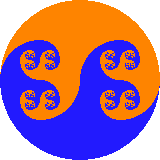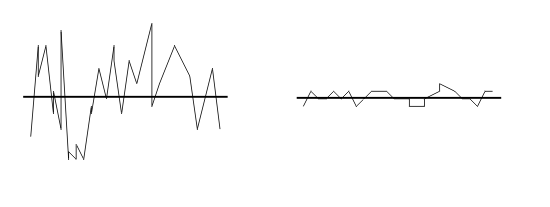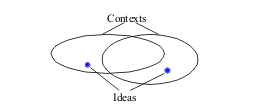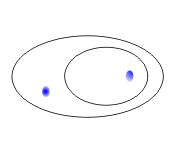
Carlos Gershenson
School of Cognitive and Computing Sciences, University of Sussex
Facultad de Filosofía y Letras, Universidad Nacional Autónoma de México
cgg unam.mx
unam.mx
In this work we try to make Schopenhauer’s ideas presented in his Die Welt als Wille und Vorstellung (The Worlds as Will and Representation) less incomplete. We will not repeat all the ideas contained there, so it is advisable if the reader is already familiar with Schopenhauer’s ideology. In spite of this, the text is understandable even if the reader is fresh in reading Schopenhauer, because the ideas presented here are not sustained on Schopenhauer’s, but complement them. In other words, we build our ideas by agreeing or disagreeing with Schopenhauer, but these new ideas can be assimilated by themselves. We agree with many ideas of Schopenhauer, so we have nothing to say about them that he has not said already. We only develop ideas where we can expand them, or where we disagree with him.
Since we base ourselves in our beliefs, some of ours are different from Schopenhauer’s, so our ideas will be different because we think in different contexts. Anyway, we will try to contain Schopenhauer’s ideas, when they do not go against our beliefs and all the ideas based on them. Others in different contexts might as well disagree with the ideas presented here or with Schopenhauer’s, but that’s why philosophy still exists: there are no absolute truths, because all ideas are related to the context they were created in. All ideas are valid in the context they were created.
Schopenhauer divides his work in four books. In the first, he describes the world as representation, and in the second the world as will, themes which will be retaken in the third and fourth books, respectively, but making emphasis on aesthetics and on ethics.
“The world is my representation”. For each individual the world exists only as his representation. The universe is just an object for a subject which can perceive it. For Schopenhauer, the will is the essence of the world: every object: mineral, vegetal, or animal... of all the universe. Matter is the objectivation of will. On one hand the world is will representation and nothing more than representation, and on another it is will and nothing more that will, and some other thing “would be a monster like the ones we see in dreams”.
We would add that the world relatively is representation, and absolutely is will
![]() (Gershenson, 2001b). This would seem contradictory using consistent logics, but if logic
does not contain our thoughts, we should just change our logic. There is no problem in
contradictions with paraconsistent logics (Priest and Tanaka, 1996), such as
multidimensional logic (Gershenson, 1998; 1999), because we contain contradictions in
order to understand them. Also, Schopenhauer does not make the distinction between
absolute and relative being (Gershenson, 2001b), and sometimes even between being and
existing, so his readers might get confused with his paradoxes.
(Gershenson, 2001b). This would seem contradictory using consistent logics, but if logic
does not contain our thoughts, we should just change our logic. There is no problem in
contradictions with paraconsistent logics (Priest and Tanaka, 1996), such as
multidimensional logic (Gershenson, 1998; 1999), because we contain contradictions in
order to understand them. Also, Schopenhauer does not make the distinction between
absolute and relative being (Gershenson, 2001b), and sometimes even between being and
existing, so his readers might get confused with his paradoxes.
We would also add that there a-is
![]() no essence in the universe, because everything is
related. Everything a-is for and because of everything. Everything is based on everything. It is
naive to try to justify the world once we are already on it. Everything is a condition of
everything, otherwise it would not be as it is. For Schopenhauer intelligence has the form
of “knowledge of the cause”. We can only know relative causes, because we are finite.
There is no final or primary cause, nor relatively nor absolutely. For a wider discussion
abut causality, please refer to Gershenson (2001b).
no essence in the universe, because everything is
related. Everything a-is for and because of everything. Everything is based on everything. It is
naive to try to justify the world once we are already on it. Everything is a condition of
everything, otherwise it would not be as it is. For Schopenhauer intelligence has the form
of “knowledge of the cause”. We can only know relative causes, because we are finite.
There is no final or primary cause, nor relatively nor absolutely. For a wider discussion
abut causality, please refer to Gershenson (2001b).
Schopenhauer, more than a century before Gödel (1931), already presented in his
ideas the concept of incompleteness. “No science can be completely demonstrable, as no
building can be suspended on air; every demonstration has to refer to an intuitive element,
and therefore, not demonstrable”. Later Gödel (1931) and Turing (1936) would formalize
these ideas, applying them to mathematics and computation. But these ideas can be applied
also for languages (formal and natural), and actually to any system based on axioms
![]() . We
believe that all our ideas are based on beliefs. Beliefs are the axioms of thought. But our
thoughts can also change our beliefs. And we need experience, to have beliefs and thoughts.
But our experience is determined by our thoughts and beliefs. Beliefs, thoughts and
experience, each one are based on each other. Which one was first? All of them, because
they all need of the others. They all are determined and determine the others. It is only
when we have beliefs, thoughts, and experience, that we can speak about being, but of
course, this would be a relative being. Therefore, we cannot try to search for an absolute
truth, only relative ones. But which relative truth will be more valuable? The less
incomplete. The evolution of ideas makes truths to evolve with them, each time making
them less incomplete
. We
believe that all our ideas are based on beliefs. Beliefs are the axioms of thought. But our
thoughts can also change our beliefs. And we need experience, to have beliefs and thoughts.
But our experience is determined by our thoughts and beliefs. Beliefs, thoughts and
experience, each one are based on each other. Which one was first? All of them, because
they all need of the others. They all are determined and determine the others. It is only
when we have beliefs, thoughts, and experience, that we can speak about being, but of
course, this would be a relative being. Therefore, we cannot try to search for an absolute
truth, only relative ones. But which relative truth will be more valuable? The less
incomplete. The evolution of ideas makes truths to evolve with them, each time making
them less incomplete
![]() . Since all ideas are valid in the context they were created in, all our
ideas are just a picture of our context. If our context is useful or contains others, this does
not affect our ideas. They will always be finite and relative, chained to our context. But
thanks to the incompleteness of language, they will never be comprehended completely.
And since all ideas are finite and limited, we all are a bit mistaken.
. Since all ideas are valid in the context they were created in, all our
ideas are just a picture of our context. If our context is useful or contains others, this does
not affect our ideas. They will always be finite and relative, chained to our context. But
thanks to the incompleteness of language, they will never be comprehended completely.
And since all ideas are finite and limited, we all are a bit mistaken.
“We can only give an explanation of how are things, but not why they are.” Why are things like they are? Well, they could not be in a different way, otherwise everything else would be different. It is not that there is a destiny, is that things cannot be in a different way. (For a wider discussion on determinism, please refer to Gershenson (2001b).
Schopenhauer argues that intuition (immediate knowledge) is safer to use to reach
truths than reason (mediate knowledge). Yes, but only mediate knowledge can be
transmitted, and our culture has been able to evolve because of the transmission of
knowledge
![]() .
.
There seems to be an eternal struggle between the world of will and the world of representation. The first could be represented as instincts, and the second as reason. Evolutionally, instincts were developed earlier than reason (Gershenson, 2001a:0.1), but nor reason nor instincts can dominate the other completely. The result of this struggle determines our behaviour. To attempt to dominate completely instincts by reason is anti-natural. It is sensible to control our instincts, but not to negate them.
In a related issue, not to suffer is inhuman. Stop suffering, and you will become extinct.
We cannot perceive “the thing itself”, which a-is, but through our representations (re-beings). Schopenhauer says that the only way to reach how things (a)are, is through art (not science nor philosophy). We would say that in some contexts this is consistent, but not in all contexts. Anyway, we already said that we believe that the a-being cannot be comprehended completely by our re-beings, so indeed art is one way to approximate the a-being, but science and philosophy are others. Which one is better, or less incomplete? In respect with what? The answer would need to have a reference point, thus being relative. We can only suggest to take all of them, since they all are valid in their own limited contexts, in order to create a wider context which will try to contain the previous ones.
Our concept of a-being does not match completely with the platonic Idea (ειδος)
managed by Schopenhauer. The a-being has no reason for not changing and being
dynamic
![]() . We believe that the platonic Ideas do not exist, they are utopic. The Idea, sorry
for the redundance, is ideal. It is unreachable.
. We believe that the platonic Ideas do not exist, they are utopic. The Idea, sorry
for the redundance, is ideal. It is unreachable.
Schopenhauer’s definition of genius (artist which can contemplate the Idea and communicate it by his work) indeed makes people fitting the concept close to the one of madness. Simply because they are different from most people. But such a person which dedicates his life to contemplation, would not survive if there would be no civilization. This is, if we would take a strict darwinist perspective (tending a bit to hitlerian...), such individuals are not fit for the natural survival of our species. But where would we be without geniuses (and madmen)? But geniuses are “able” to survive because we do not live in caves anymore. There is not so much sense in speaking about “natural evolution” because it has been artificial since culture began to evolve. We have changed our environment in such a way that the “fitness” of natural selection, for better and for worse, has stopped being the main director of our evolution.
Returning to art, we do not believe in an absolute beauty
![]() . All beauty is relative.
Therefore, a work of art will be appreciated in contexts where the work of art
communicates successfully an idea (not platonic). Also, in the early XIXth century there
were not so much art expressions. For example, according to Schopenhauer’s definitions,
vanguardism would not be art...
. All beauty is relative.
Therefore, a work of art will be appreciated in contexts where the work of art
communicates successfully an idea (not platonic). Also, in the early XIXth century there
were not so much art expressions. For example, according to Schopenhauer’s definitions,
vanguardism would not be art...
We believe that art is a form of communication. But the information which is communicated is necessarily related to a specific context, which perhaps is not shared by many people. Therefore, people will not appreciate art which does not tell them anything (in their context). A work of art will be less incomplete as it contains more contexts. Note that the number of contexts is independent of the number of people which share one context. In this sense, most people share few contexts, while few people have their particular context. An example would be a masterpiece which is valid in several contexts, not only of the time it was created, but in all (or at least most) the contexts of its history has been appreciated. But any work of art is incomplete.
About music, we would say that it communicates emotional states through musical languages.
Schopenhauer believed that life only produces grief, because it is guided mainly by will, which makes us desire constantly. If we do not achieve our desires, we are miserable, and if we do, we are bored. We will have to object that to feel misery one needs to feel joy (to know how to compare), and vice versa: One will enjoy more the more he/she has suffered. We know that we are suffering only when we have had pleasures, and vice versa. We would say that the balance between joy and grief is always the same, but the amplitude is the only one which varies, depending on the will of the individuals. The higher will, the life will be more intense, feeling more grief AND more joy. If the will is not strong, there will be not so much deceptions, but also not so much desires, falling into a lethargic life. We will not argue that one of these is “better”. Each individual is fit for his/her own will. According to his/her needs he/she will experience intensity or lethargy. Figure 1 shows a graphical representation of these ideas.
 Figure 1. Representations of intensive and lethargic lives.
Figure 1. Representations of intensive and lethargic lives.
We could say that a saint, according to Schopenhauer’s sense, is beyond desire and
deception. But, as he negates his will, it is his will to negate his will. So, supposing he
achieves this, he will have and not have will at the same time
![]() . Holiness and abnegation are
unnatural states, in a similar way than genius. If all the individuals in a society would be
saints, they would become extinct. We do not know if saints are or not necessary for the
“unholy” rest of the society, but the “unholy” society is clearly necessary for the saints (As
kings need people to make them feel kings? Perhaps, but independently of this they need
“unholiness” of others to be born and fed). Again, we believe that the will should not be
suppressed nor negated
. Holiness and abnegation are
unnatural states, in a similar way than genius. If all the individuals in a society would be
saints, they would become extinct. We do not know if saints are or not necessary for the
“unholy” rest of the society, but the “unholy” society is clearly necessary for the saints (As
kings need people to make them feel kings? Perhaps, but independently of this they need
“unholiness” of others to be born and fed). Again, we believe that the will should not be
suppressed nor negated
![]() , but comprehended and balanced. But also we should note that
the border between will (instincts) and representation (reason) is not at all well-defined.
If an individual is guided by motives and by ideas in a balanced way, he will be more
complete, and without internal contradictions and conflicts.
, but comprehended and balanced. But also we should note that
the border between will (instincts) and representation (reason) is not at all well-defined.
If an individual is guided by motives and by ideas in a balanced way, he will be more
complete, and without internal contradictions and conflicts.
Everyone should just try to find the place which is naturally more fit for him/her, not
letting others (e.g. marketing, mass media, politicians, philosophers... (yes, I include
myself)) induce him/her the place he/she should be in. Some people are fit to be “saints”,
other are fit to be “sinners”, others to be both... and the judgement of who “is living in the
right way” and who is “living in the wrong way” is necessarily relative
![]() . Why to listen to
someone who does not contain my context? And if he/she does, I am free to decide.
Therefore, we should tolerate other ways of life, because each individual has his/her own
context which we cannot comprehend completely (as we cannot comprehend completely
ourselves).
. Why to listen to
someone who does not contain my context? And if he/she does, I am free to decide.
Therefore, we should tolerate other ways of life, because each individual has his/her own
context which we cannot comprehend completely (as we cannot comprehend completely
ourselves).
Schopenhauer says that the will is free. We would say that the infinite will is free, but the individual will is not free, because the will in the individual (objectivation) is tied to the object, and therefore it is dependent of it, and enslaved by its finitude. But one re-is free in the moment he/she believes him/herself free.
Schopenhauer also speaks about the “full consciousness of the will of itself, the clear and finished knowledge of its own essence”. This is impossible, because this knowledge about itself would affect it (like any observer affects the observed), and it would imply that it would need to know itself more (While increasing the knowledge it increases itself and it can never comprehend itself completely (without being infinite)).
There is injustice by nature in men (and in nature). The struggle between wills is
injust, and this is what moves evolution
![]() . We agree with Schopenhauer when he says that
justice and injustice (re)are determined by moral.
. We agree with Schopenhauer when he says that
justice and injustice (re)are determined by moral.
Conflicts (and injustice) are caused by incompatible ideas due to differences of context(s). Two ideas are incompatible when in one context they are valid and in another they are not. These contexts, even when they have other similar ideas, they do not share the causes of the conflicts.
 Figure 2. Incompatible ideas in different contexts.
Figure 2. Incompatible ideas in different contexts.
In a similar way, one can enter into conflict with oneself when and idea is not compatible with another one in one part of his/her context (incompatible subcontexts). It seems that in most conflicts the idea incompatibility is bilateral. For example, a driver goes distracted because he spent a night with his lover. Another driver gets angry with him because the first driver is blocking the way and the second driver is in a hurry. The distracted driver is not aware of the effect of his actions, until he gets an insult, and the driver in a hurry has no awareness of the cause of the state of the other driver.
 Figure 3. Example of incompatible ideas in different contexts.
Figure 3. Example of incompatible ideas in different contexts.
Each driver is not aware of the idea of the other. If this would be in a different way, the conflict might be avoided (not always).
 Figure 4. One context contains
the ideas of the other.
Figure 4. One context contains
the ideas of the other.
If the incompatibility is unilateral (a context contains the other), there is a lower possibility for a conflict, because it would be also unilateral, and therefore it does not receive feedback as in the bilateral case.
The larger our context is, we will be able to avoid more conflicts. And what
determines the size of a context is just knowledge
![]() .
.
We are all evil in some degree, just because of inconscience.
It seems that selfish individuals have more possibilities for surviving. Perhaps that
is why society is as it is? But it seems that this is more a social and cultural than a genetic
phenomena (For example, in times of war people might become more cooperative). And
it seems that having a society of “social” individuals means that they need to be
homogenous, i.e. sacrificing the individuality (e.g. communism). But extremely social and
extremely antisocial individuals (e.g. anarchists) do not seem to lead to suitable societies.
There should be a balance between the individuality and the sociality
![]() .
.
Gershenson, C. (1998) Lógica multidimensional: un modelo de lógica paraconsistente. Memorias XI Congreso Nacional ANIEI, pp. 132-141. Xalapa, México.
Gershenson, C. (1999). Modelling Emotions with Multidimensional Logic. Proceedings of the 18thInternational Conference of the North American Fuzzy Information Processing Society (NAFIPS ‘99), pp. 42-46. New York City, NY.
Gershenson, C. (2001a). Artificial Societies of Intelligent Agents. Unpublished BEng Thesis. Fundación Arturo Rosenblueth, México.
Gershenson, C. (2001b). Complex Philosophy. To appear.
Gödel, Kurt (1931). Über formal unentscheidbare Sätze der Principia Mathematica und verwandter Systeme, I. Monatshefte für Mathematik und Physik, vol. XXXVIII, pp. 173-198.
Priest, G. and Tanaka, K. (1996). Paraconsistent Logic, Stanford Encyclopedia of Philosophy.
Schopenhauer, Artur. (1819). Die Welt als Wille und Vorstellung.
Turing, A. M. (1936-7). On Computable Numbers, with an Application to the Entscheidungsproblem. Proc. London Math. Soc. (2), 42, pp. 230-265.